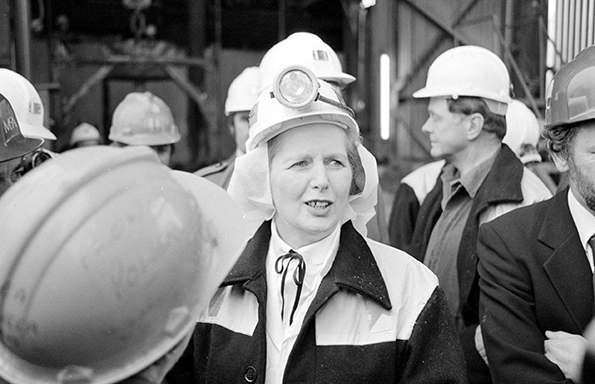
Steven Daniels is a PhD candidate in the University of Liverpool’s Department of Politics
With the rise of Jeremy Corbyn, much has been made of a return to the politics of the 1970s, when trade unions dominated the political agenda and major state industries were nationalised.
One of those industries was coal. Before 1994, the coal industry was publicly owned and the vast majority of coal miners favoured this arrangement. The two most powerful trade unions of the time – Arthur Scargill’s National Union of Mineworkers (NUM) and Roy Lynk’s Union of Democratic Mineworkers (UDM) – both clashed with Margaret Thatcher’s government as it sought to privatise coal.
But newly released files reveal that Lynk’s UDM had far closer ties to Thatcher than previously thought.
Lynk met Thatcher three times between 1986 and 1989 – and he insisted each time that the details of these meetings be kept secret. Now, 30 years later, the secret is out, and it’s clear why he was eager for the information not to become public. Files from the National Archives in London on these meetings shed new light on the true nature of the UDM and its plans for the industry. The minutes of the meeting note:
Mr Lynk … wished to clarify the UDM’s position on coal privatisation. The Union’s public position had to be one of opposition. But privately the union leadership supported privatisation and saw it as an opportunity.
Accusations of being in the back pocket of the Thatcher government dogged the UDM for years, but no proof could ever be produced – until now. Had Lynk’s position on privatisation been known in the 1980s, it would have been a major scandal that could have crippled his organisation. The new files make it clear just how close the two parties were, and how vital an ally the government considered the UDM to be. David Norgrove’s report on their October 1986 meeting showed how “The Prime Minister … emphasised her great concern that everything possible should be done to help the UDM”.
This was not an isolated incident. Notes prepared for the meetings emphasise how committed various government and government-owned agencies were to helping the UDM. Energy minister Peter Walker, in preparing a brief on the UDM for Thatcher, stressed that he and junior whip David Hunt “have done everything in our power to be of assistance to the UDM”. Similarly, Robert Haslam, chairman of the taxpayer owned National Coal Board, stressed the important role the UDM played in reshaping post-strike industrial relations, telling Walker “There is indeed a great advantage to us in the continuance of the UDM so long as we have anything like the present NUM leadership”.
The UDM was clearly being rewarded for cooperating with the Thatcher government. Notes between ministers make regular reference to how the union was being given preferential treatment over Scargill’s NUM. At each meeting, UDM leaders were reassured by Thatcher that they were free to approach her at any time, and that guidance, support, and training was to be provided to them.
Crucially, this preferential treatment was extended to uneconomical pits. Notes prepared by civil servants for Thatcher’s January 1988 meeting with the UDM reveal that certain pits would have closed earlier had they been controlled by the NUM. UDM control could help buy a pit extra time.
Cadley Hill colliery in Derbyshire is singled out as a pit which was given a stay of execution on this basis, with “some marginal pits … being given great encouragement to reach profitability”, the inference being that NUM pits were being left to fend for themselves, while UDM pits were given a leg up to remain economically viable.
Set up in the dying days of the 1984-5 miners’ strike, the UDM positioned itself as an alternative for “moderate” miners who felt that the hard-left NUM, under Scargill, no longer represented their interests. It was smaller than the NUM but had at least some members in virtually every pit in the country, representing between a fifth and a third of the total workforce at various points before privatisation.
For many NUM supporters and Scargill loyalists, the UDM will always be a scab union – a byword for betrayal. They argue that the UDM split the miners by setting itself up as a rival to the NUM, leaving the latter too weak to defend the industry effectively.
The last deep coal mine in Britain, Kellingley, closed in December 2015. This followed nearly three decades of pit closures, each one declared too uneconomical to keep open – a drain on public finances that the Thatcher and John Major governments believed the taxpayer would not tolerate.
![]() Significant divisions remain in former mining towns in the UK. For some, these revelations about the UDM will justify their view that the breakaway union was too close to the Thatcher government, and no doubt provide some closure. Others will feel betrayed by the union that was supposed to be protecting them. Either way, the old arguments are bound to resurface, made new again with these files.
Significant divisions remain in former mining towns in the UK. For some, these revelations about the UDM will justify their view that the breakaway union was too close to the Thatcher government, and no doubt provide some closure. Others will feel betrayed by the union that was supposed to be protecting them. Either way, the old arguments are bound to resurface, made new again with these files.
This article was originally published on The Conversation. Read the original article.